HI6026: Auditor's Public Interest Responsibilities & Audit Quality
VerifiedAdded on 2023/04/21
|19
|4677
|328
Report
AI Summary
This report provides a comprehensive analysis of auditor's public interest responsibilities and audit quality, focusing on the impact of material misstatements on stakeholders of CSR Limited. It explores concepts of auditor independence, whistleblowing with reference to APES 110, and lessons learned from the Enron scandal, including the behavior of Arthur Andersen. The report emphasizes the importance of ethical conduct and robust auditing standards to prevent financial crises and ensure accurate financial reporting. It also highlights the relationship between auditors and audit committees, the need for improved internal audit control, and the significance of audit as a global profession. The analysis draws upon various academic sources and regulatory guidelines to support its findings and recommendations.
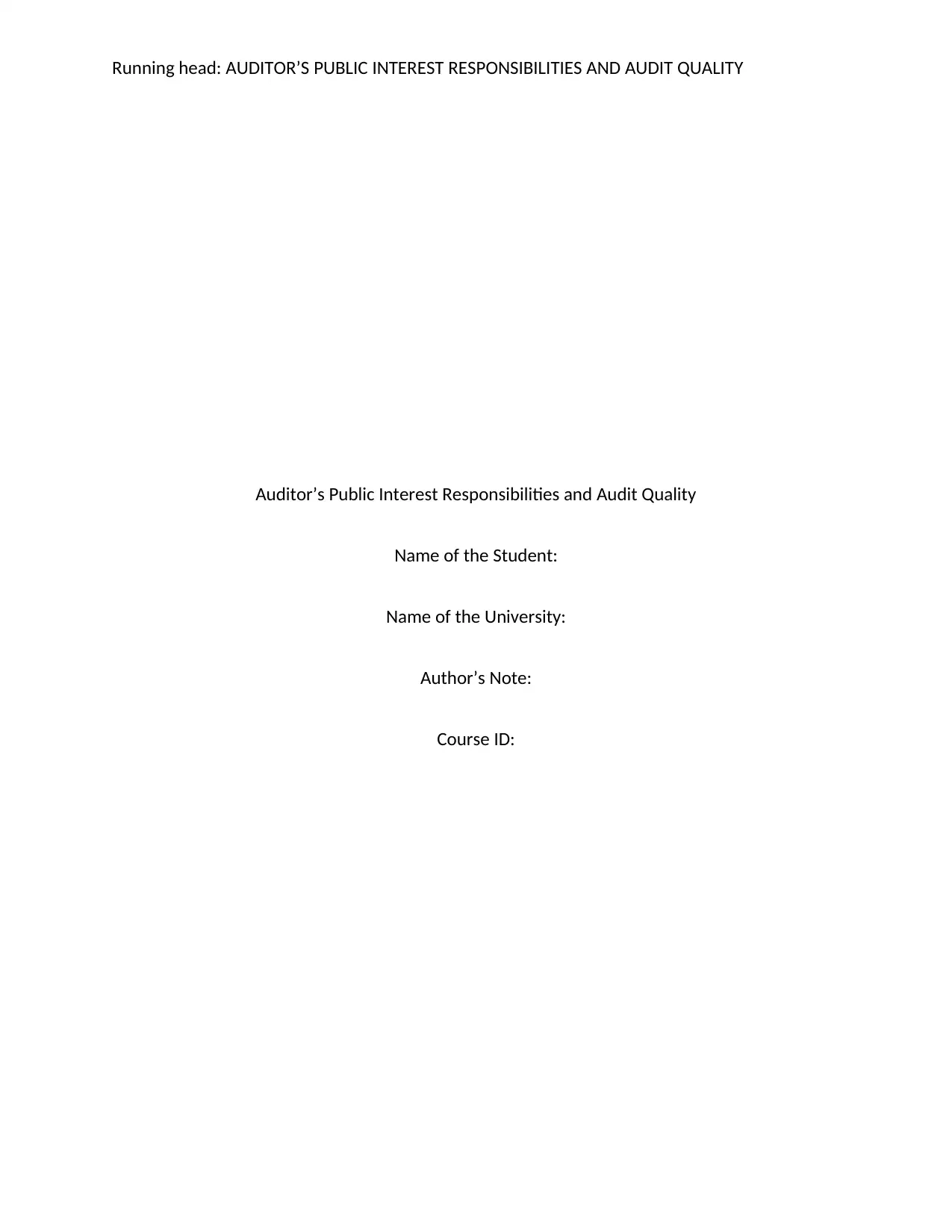
Running head: AUDITOR’S PUBLIC INTEREST RESPONSIBILITIES AND AUDIT QUALITY
Auditor’s Public Interest Responsibilities and Audit Quality
Name of the Student:
Name of the University:
Author’s Note:
Course ID:
Auditor’s Public Interest Responsibilities and Audit Quality
Name of the Student:
Name of the University:
Author’s Note:
Course ID:
Paraphrase This Document
Need a fresh take? Get an instant paraphrase of this document with our AI Paraphraser
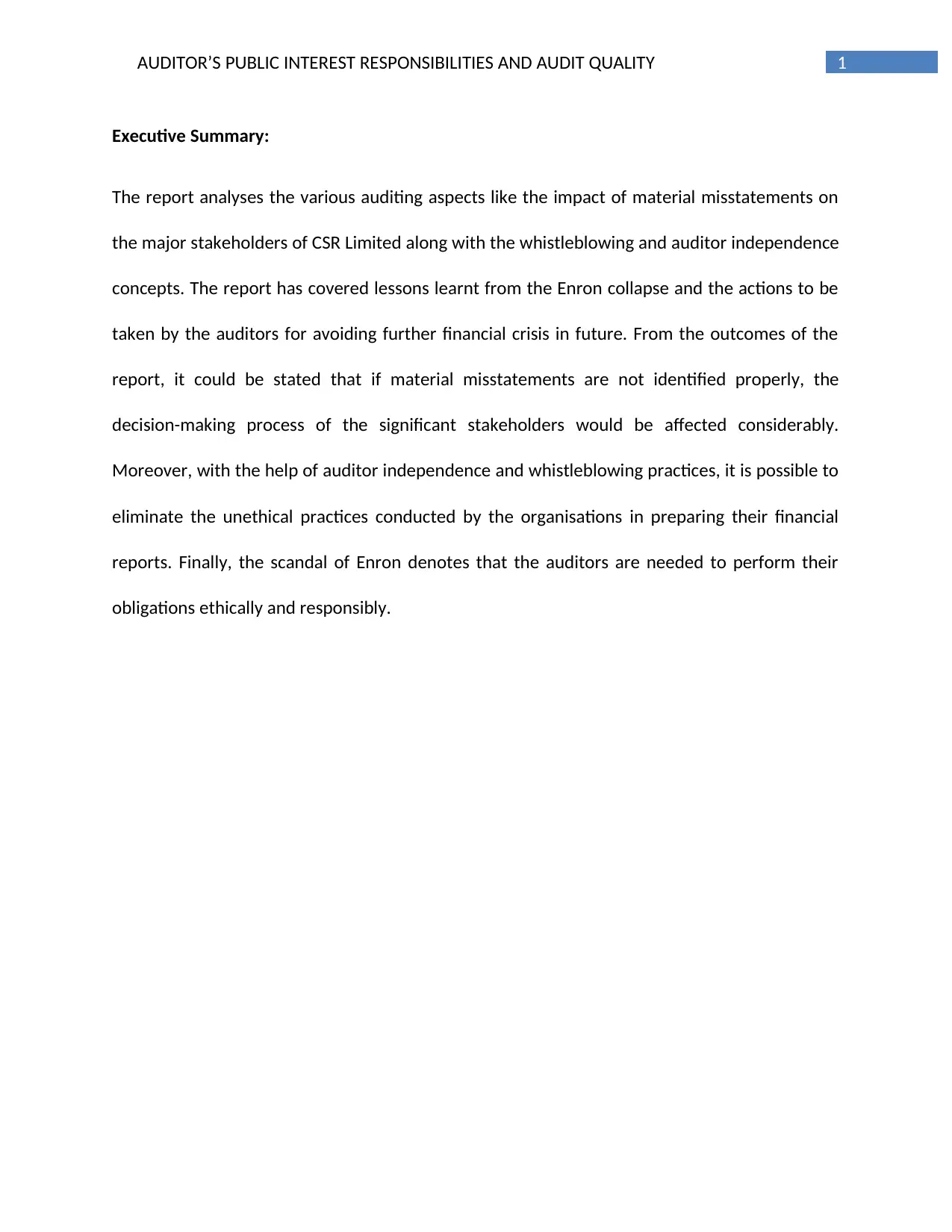
1AUDITOR’S PUBLIC INTEREST RESPONSIBILITIES AND AUDIT QUALITY
Executive Summary:
The report analyses the various auditing aspects like the impact of material misstatements on
the major stakeholders of CSR Limited along with the whistleblowing and auditor independence
concepts. The report has covered lessons learnt from the Enron collapse and the actions to be
taken by the auditors for avoiding further financial crisis in future. From the outcomes of the
report, it could be stated that if material misstatements are not identified properly, the
decision-making process of the significant stakeholders would be affected considerably.
Moreover, with the help of auditor independence and whistleblowing practices, it is possible to
eliminate the unethical practices conducted by the organisations in preparing their financial
reports. Finally, the scandal of Enron denotes that the auditors are needed to perform their
obligations ethically and responsibly.
Executive Summary:
The report analyses the various auditing aspects like the impact of material misstatements on
the major stakeholders of CSR Limited along with the whistleblowing and auditor independence
concepts. The report has covered lessons learnt from the Enron collapse and the actions to be
taken by the auditors for avoiding further financial crisis in future. From the outcomes of the
report, it could be stated that if material misstatements are not identified properly, the
decision-making process of the significant stakeholders would be affected considerably.
Moreover, with the help of auditor independence and whistleblowing practices, it is possible to
eliminate the unethical practices conducted by the organisations in preparing their financial
reports. Finally, the scandal of Enron denotes that the auditors are needed to perform their
obligations ethically and responsibly.
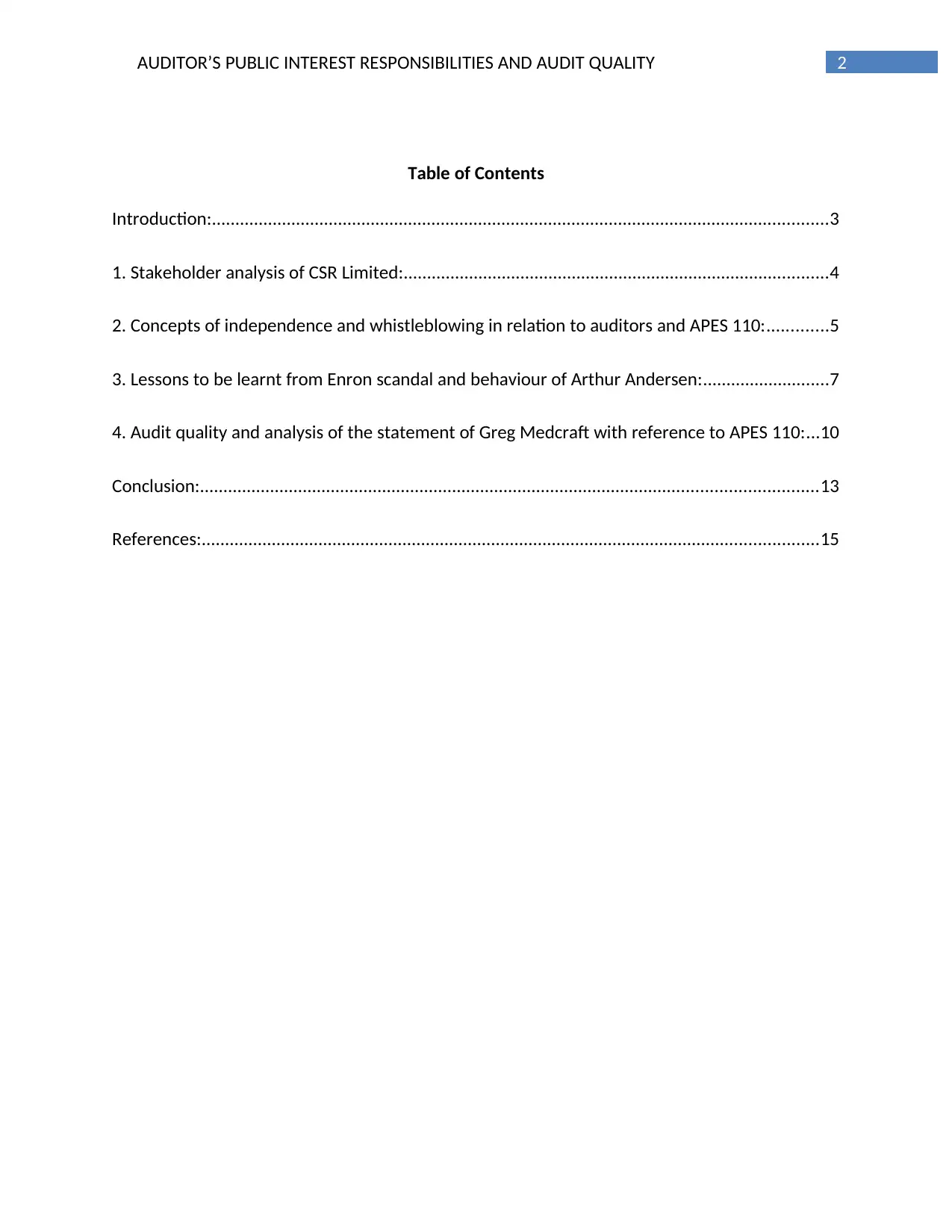
2AUDITOR’S PUBLIC INTEREST RESPONSIBILITIES AND AUDIT QUALITY
Table of Contents
Introduction:....................................................................................................................................3
1. Stakeholder analysis of CSR Limited:...........................................................................................4
2. Concepts of independence and whistleblowing in relation to auditors and APES 110:.............5
3. Lessons to be learnt from Enron scandal and behaviour of Arthur Andersen:...........................7
4. Audit quality and analysis of the statement of Greg Medcraft with reference to APES 110:...10
Conclusion:....................................................................................................................................13
References:....................................................................................................................................15
Table of Contents
Introduction:....................................................................................................................................3
1. Stakeholder analysis of CSR Limited:...........................................................................................4
2. Concepts of independence and whistleblowing in relation to auditors and APES 110:.............5
3. Lessons to be learnt from Enron scandal and behaviour of Arthur Andersen:...........................7
4. Audit quality and analysis of the statement of Greg Medcraft with reference to APES 110:...10
Conclusion:....................................................................................................................................13
References:....................................................................................................................................15
⊘ This is a preview!⊘
Do you want full access?
Subscribe today to unlock all pages.

Trusted by 1+ million students worldwide
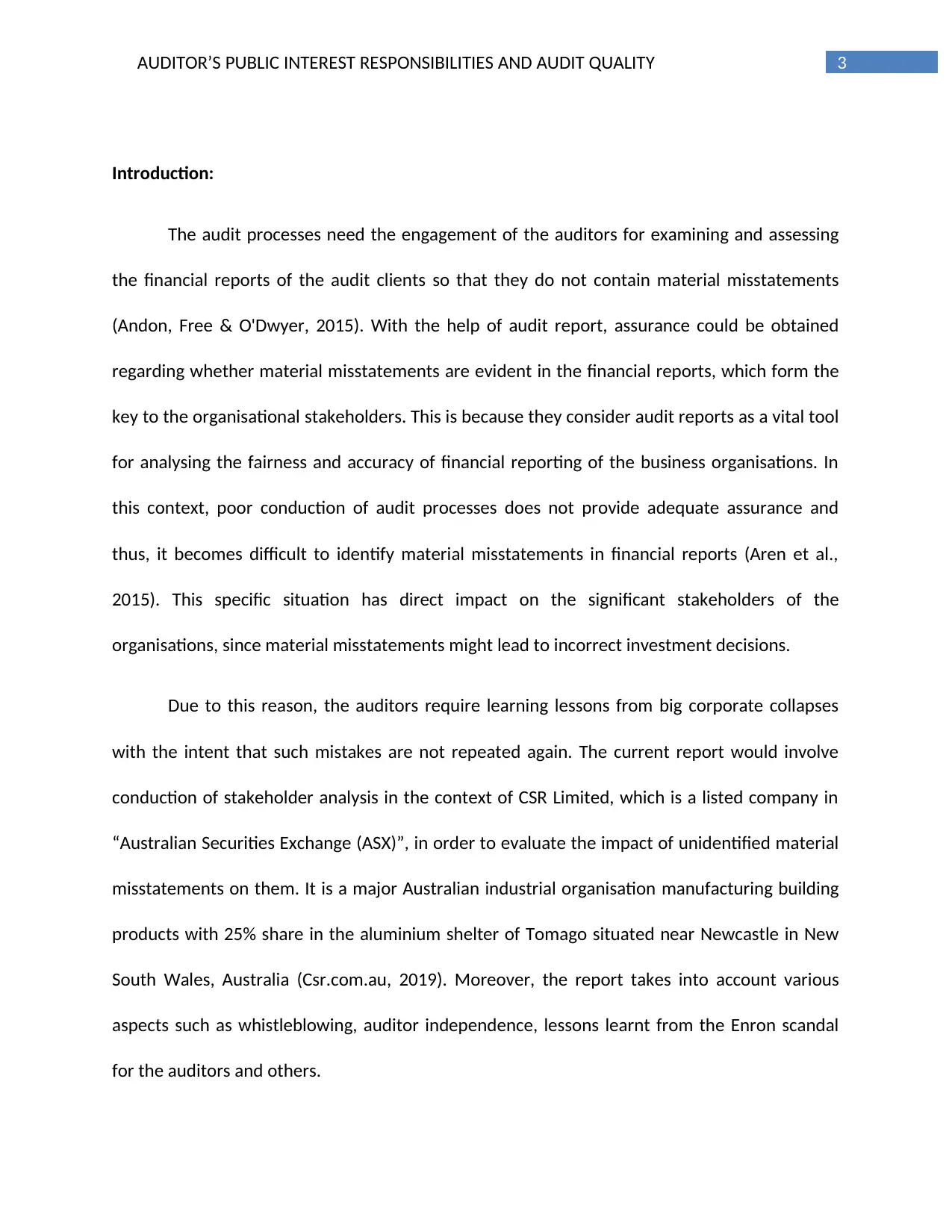
3AUDITOR’S PUBLIC INTEREST RESPONSIBILITIES AND AUDIT QUALITY
Introduction:
The audit processes need the engagement of the auditors for examining and assessing
the financial reports of the audit clients so that they do not contain material misstatements
(Andon, Free & O'Dwyer, 2015). With the help of audit report, assurance could be obtained
regarding whether material misstatements are evident in the financial reports, which form the
key to the organisational stakeholders. This is because they consider audit reports as a vital tool
for analysing the fairness and accuracy of financial reporting of the business organisations. In
this context, poor conduction of audit processes does not provide adequate assurance and
thus, it becomes difficult to identify material misstatements in financial reports (Aren et al.,
2015). This specific situation has direct impact on the significant stakeholders of the
organisations, since material misstatements might lead to incorrect investment decisions.
Due to this reason, the auditors require learning lessons from big corporate collapses
with the intent that such mistakes are not repeated again. The current report would involve
conduction of stakeholder analysis in the context of CSR Limited, which is a listed company in
“Australian Securities Exchange (ASX)”, in order to evaluate the impact of unidentified material
misstatements on them. It is a major Australian industrial organisation manufacturing building
products with 25% share in the aluminium shelter of Tomago situated near Newcastle in New
South Wales, Australia (Csr.com.au, 2019). Moreover, the report takes into account various
aspects such as whistleblowing, auditor independence, lessons learnt from the Enron scandal
for the auditors and others.
Introduction:
The audit processes need the engagement of the auditors for examining and assessing
the financial reports of the audit clients so that they do not contain material misstatements
(Andon, Free & O'Dwyer, 2015). With the help of audit report, assurance could be obtained
regarding whether material misstatements are evident in the financial reports, which form the
key to the organisational stakeholders. This is because they consider audit reports as a vital tool
for analysing the fairness and accuracy of financial reporting of the business organisations. In
this context, poor conduction of audit processes does not provide adequate assurance and
thus, it becomes difficult to identify material misstatements in financial reports (Aren et al.,
2015). This specific situation has direct impact on the significant stakeholders of the
organisations, since material misstatements might lead to incorrect investment decisions.
Due to this reason, the auditors require learning lessons from big corporate collapses
with the intent that such mistakes are not repeated again. The current report would involve
conduction of stakeholder analysis in the context of CSR Limited, which is a listed company in
“Australian Securities Exchange (ASX)”, in order to evaluate the impact of unidentified material
misstatements on them. It is a major Australian industrial organisation manufacturing building
products with 25% share in the aluminium shelter of Tomago situated near Newcastle in New
South Wales, Australia (Csr.com.au, 2019). Moreover, the report takes into account various
aspects such as whistleblowing, auditor independence, lessons learnt from the Enron scandal
for the auditors and others.
Paraphrase This Document
Need a fresh take? Get an instant paraphrase of this document with our AI Paraphraser
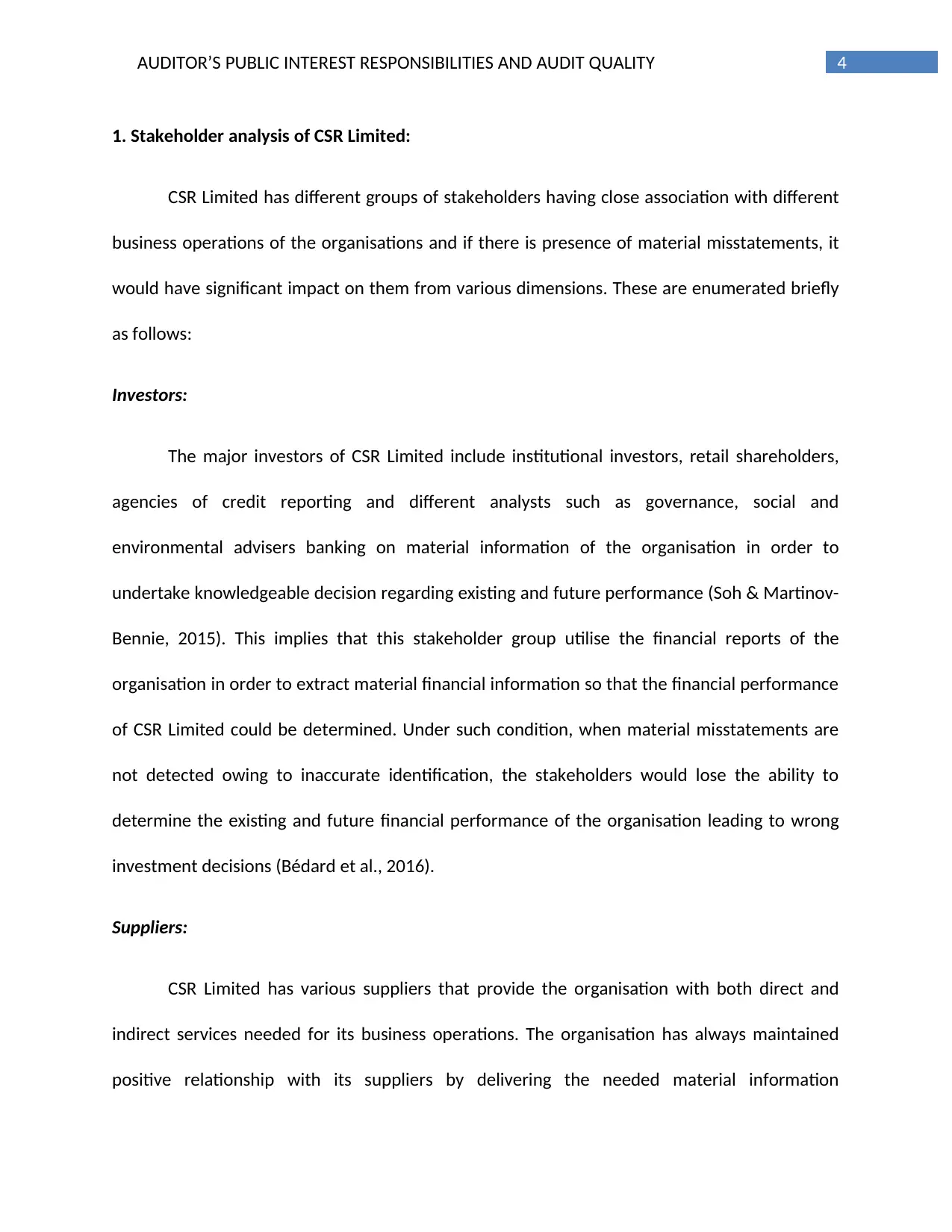
4AUDITOR’S PUBLIC INTEREST RESPONSIBILITIES AND AUDIT QUALITY
1. Stakeholder analysis of CSR Limited:
CSR Limited has different groups of stakeholders having close association with different
business operations of the organisations and if there is presence of material misstatements, it
would have significant impact on them from various dimensions. These are enumerated briefly
as follows:
Investors:
The major investors of CSR Limited include institutional investors, retail shareholders,
agencies of credit reporting and different analysts such as governance, social and
environmental advisers banking on material information of the organisation in order to
undertake knowledgeable decision regarding existing and future performance (Soh & Martinov-
Bennie, 2015). This implies that this stakeholder group utilise the financial reports of the
organisation in order to extract material financial information so that the financial performance
of CSR Limited could be determined. Under such condition, when material misstatements are
not detected owing to inaccurate identification, the stakeholders would lose the ability to
determine the existing and future financial performance of the organisation leading to wrong
investment decisions (Bédard et al., 2016).
Suppliers:
CSR Limited has various suppliers that provide the organisation with both direct and
indirect services needed for its business operations. The organisation has always maintained
positive relationship with its suppliers by delivering the needed material information
1. Stakeholder analysis of CSR Limited:
CSR Limited has different groups of stakeholders having close association with different
business operations of the organisations and if there is presence of material misstatements, it
would have significant impact on them from various dimensions. These are enumerated briefly
as follows:
Investors:
The major investors of CSR Limited include institutional investors, retail shareholders,
agencies of credit reporting and different analysts such as governance, social and
environmental advisers banking on material information of the organisation in order to
undertake knowledgeable decision regarding existing and future performance (Soh & Martinov-
Bennie, 2015). This implies that this stakeholder group utilise the financial reports of the
organisation in order to extract material financial information so that the financial performance
of CSR Limited could be determined. Under such condition, when material misstatements are
not detected owing to inaccurate identification, the stakeholders would lose the ability to
determine the existing and future financial performance of the organisation leading to wrong
investment decisions (Bédard et al., 2016).
Suppliers:
CSR Limited has various suppliers that provide the organisation with both direct and
indirect services needed for its business operations. The organisation has always maintained
positive relationship with its suppliers by delivering the needed material information
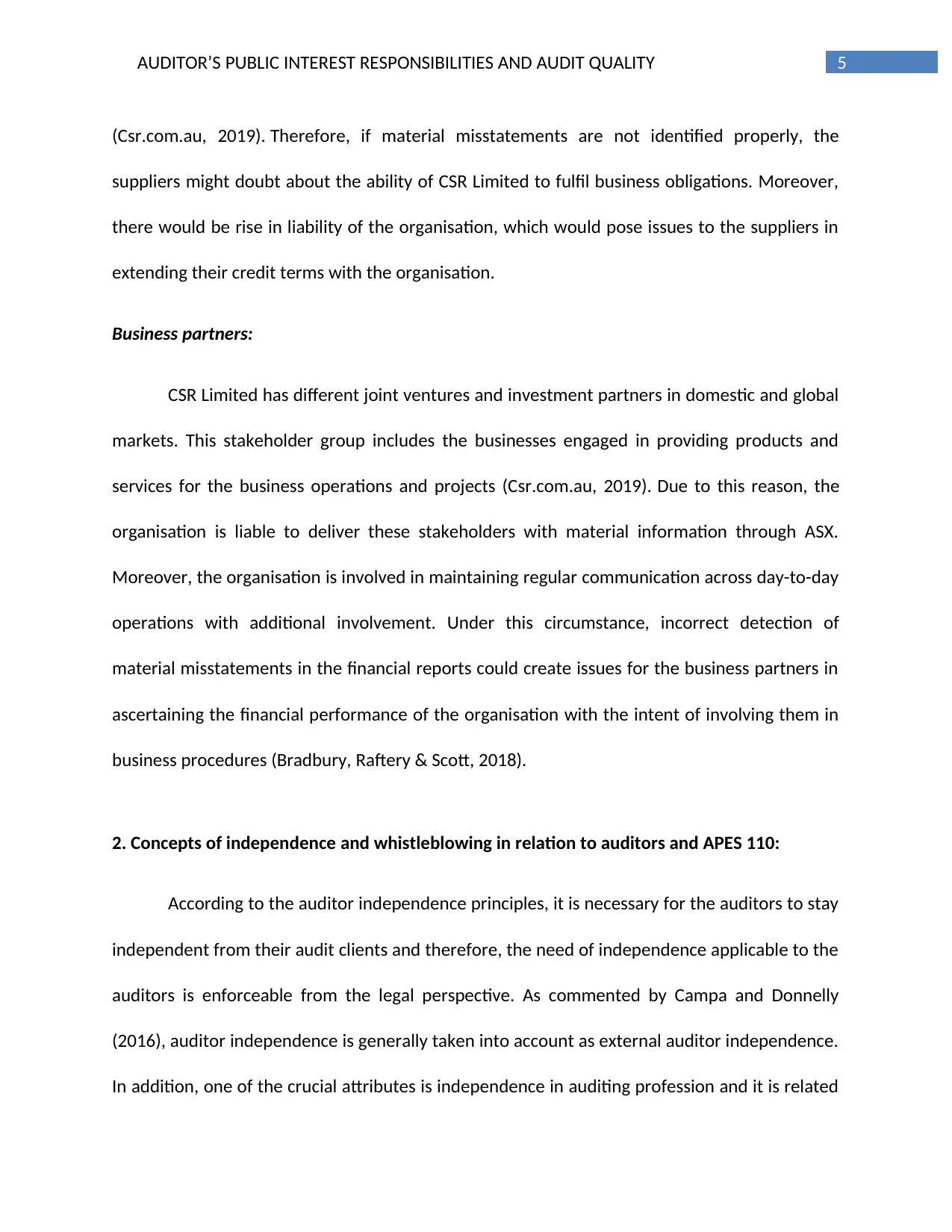
5AUDITOR’S PUBLIC INTEREST RESPONSIBILITIES AND AUDIT QUALITY
(Csr.com.au, 2019). Therefore, if material misstatements are not identified properly, the
suppliers might doubt about the ability of CSR Limited to fulfil business obligations. Moreover,
there would be rise in liability of the organisation, which would pose issues to the suppliers in
extending their credit terms with the organisation.
Business partners:
CSR Limited has different joint ventures and investment partners in domestic and global
markets. This stakeholder group includes the businesses engaged in providing products and
services for the business operations and projects (Csr.com.au, 2019). Due to this reason, the
organisation is liable to deliver these stakeholders with material information through ASX.
Moreover, the organisation is involved in maintaining regular communication across day-to-day
operations with additional involvement. Under this circumstance, incorrect detection of
material misstatements in the financial reports could create issues for the business partners in
ascertaining the financial performance of the organisation with the intent of involving them in
business procedures (Bradbury, Raftery & Scott, 2018).
2. Concepts of independence and whistleblowing in relation to auditors and APES 110:
According to the auditor independence principles, it is necessary for the auditors to stay
independent from their audit clients and therefore, the need of independence applicable to the
auditors is enforceable from the legal perspective. As commented by Campa and Donnelly
(2016), auditor independence is generally taken into account as external auditor independence.
In addition, one of the crucial attributes is independence in auditing profession and it is related
(Csr.com.au, 2019). Therefore, if material misstatements are not identified properly, the
suppliers might doubt about the ability of CSR Limited to fulfil business obligations. Moreover,
there would be rise in liability of the organisation, which would pose issues to the suppliers in
extending their credit terms with the organisation.
Business partners:
CSR Limited has different joint ventures and investment partners in domestic and global
markets. This stakeholder group includes the businesses engaged in providing products and
services for the business operations and projects (Csr.com.au, 2019). Due to this reason, the
organisation is liable to deliver these stakeholders with material information through ASX.
Moreover, the organisation is involved in maintaining regular communication across day-to-day
operations with additional involvement. Under this circumstance, incorrect detection of
material misstatements in the financial reports could create issues for the business partners in
ascertaining the financial performance of the organisation with the intent of involving them in
business procedures (Bradbury, Raftery & Scott, 2018).
2. Concepts of independence and whistleblowing in relation to auditors and APES 110:
According to the auditor independence principles, it is necessary for the auditors to stay
independent from their audit clients and therefore, the need of independence applicable to the
auditors is enforceable from the legal perspective. As commented by Campa and Donnelly
(2016), auditor independence is generally taken into account as external auditor independence.
In addition, one of the crucial attributes is independence in auditing profession and it is related
⊘ This is a preview!⊘
Do you want full access?
Subscribe today to unlock all pages.

Trusted by 1+ million students worldwide
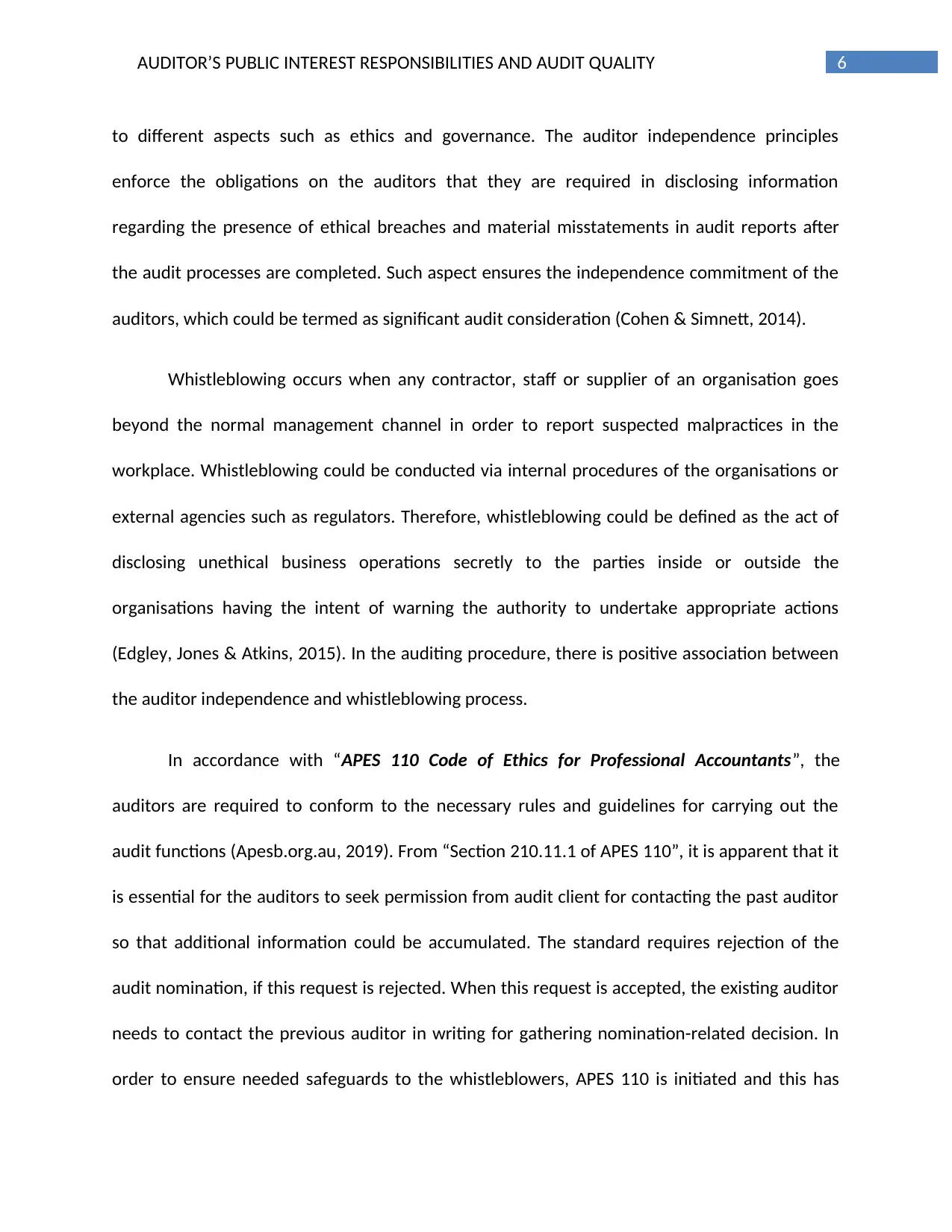
6AUDITOR’S PUBLIC INTEREST RESPONSIBILITIES AND AUDIT QUALITY
to different aspects such as ethics and governance. The auditor independence principles
enforce the obligations on the auditors that they are required in disclosing information
regarding the presence of ethical breaches and material misstatements in audit reports after
the audit processes are completed. Such aspect ensures the independence commitment of the
auditors, which could be termed as significant audit consideration (Cohen & Simnett, 2014).
Whistleblowing occurs when any contractor, staff or supplier of an organisation goes
beyond the normal management channel in order to report suspected malpractices in the
workplace. Whistleblowing could be conducted via internal procedures of the organisations or
external agencies such as regulators. Therefore, whistleblowing could be defined as the act of
disclosing unethical business operations secretly to the parties inside or outside the
organisations having the intent of warning the authority to undertake appropriate actions
(Edgley, Jones & Atkins, 2015). In the auditing procedure, there is positive association between
the auditor independence and whistleblowing process.
In accordance with “APES 110 Code of Ethics for Professional Accountants”, the
auditors are required to conform to the necessary rules and guidelines for carrying out the
audit functions (Apesb.org.au, 2019). From “Section 210.11.1 of APES 110”, it is apparent that it
is essential for the auditors to seek permission from audit client for contacting the past auditor
so that additional information could be accumulated. The standard requires rejection of the
audit nomination, if this request is rejected. When this request is accepted, the existing auditor
needs to contact the previous auditor in writing for gathering nomination-related decision. In
order to ensure needed safeguards to the whistleblowers, APES 110 is initiated and this has
to different aspects such as ethics and governance. The auditor independence principles
enforce the obligations on the auditors that they are required in disclosing information
regarding the presence of ethical breaches and material misstatements in audit reports after
the audit processes are completed. Such aspect ensures the independence commitment of the
auditors, which could be termed as significant audit consideration (Cohen & Simnett, 2014).
Whistleblowing occurs when any contractor, staff or supplier of an organisation goes
beyond the normal management channel in order to report suspected malpractices in the
workplace. Whistleblowing could be conducted via internal procedures of the organisations or
external agencies such as regulators. Therefore, whistleblowing could be defined as the act of
disclosing unethical business operations secretly to the parties inside or outside the
organisations having the intent of warning the authority to undertake appropriate actions
(Edgley, Jones & Atkins, 2015). In the auditing procedure, there is positive association between
the auditor independence and whistleblowing process.
In accordance with “APES 110 Code of Ethics for Professional Accountants”, the
auditors are required to conform to the necessary rules and guidelines for carrying out the
audit functions (Apesb.org.au, 2019). From “Section 210.11.1 of APES 110”, it is apparent that it
is essential for the auditors to seek permission from audit client for contacting the past auditor
so that additional information could be accumulated. The standard requires rejection of the
audit nomination, if this request is rejected. When this request is accepted, the existing auditor
needs to contact the previous auditor in writing for gathering nomination-related decision. In
order to ensure needed safeguards to the whistleblowers, APES 110 is initiated and this has
Paraphrase This Document
Need a fresh take? Get an instant paraphrase of this document with our AI Paraphraser
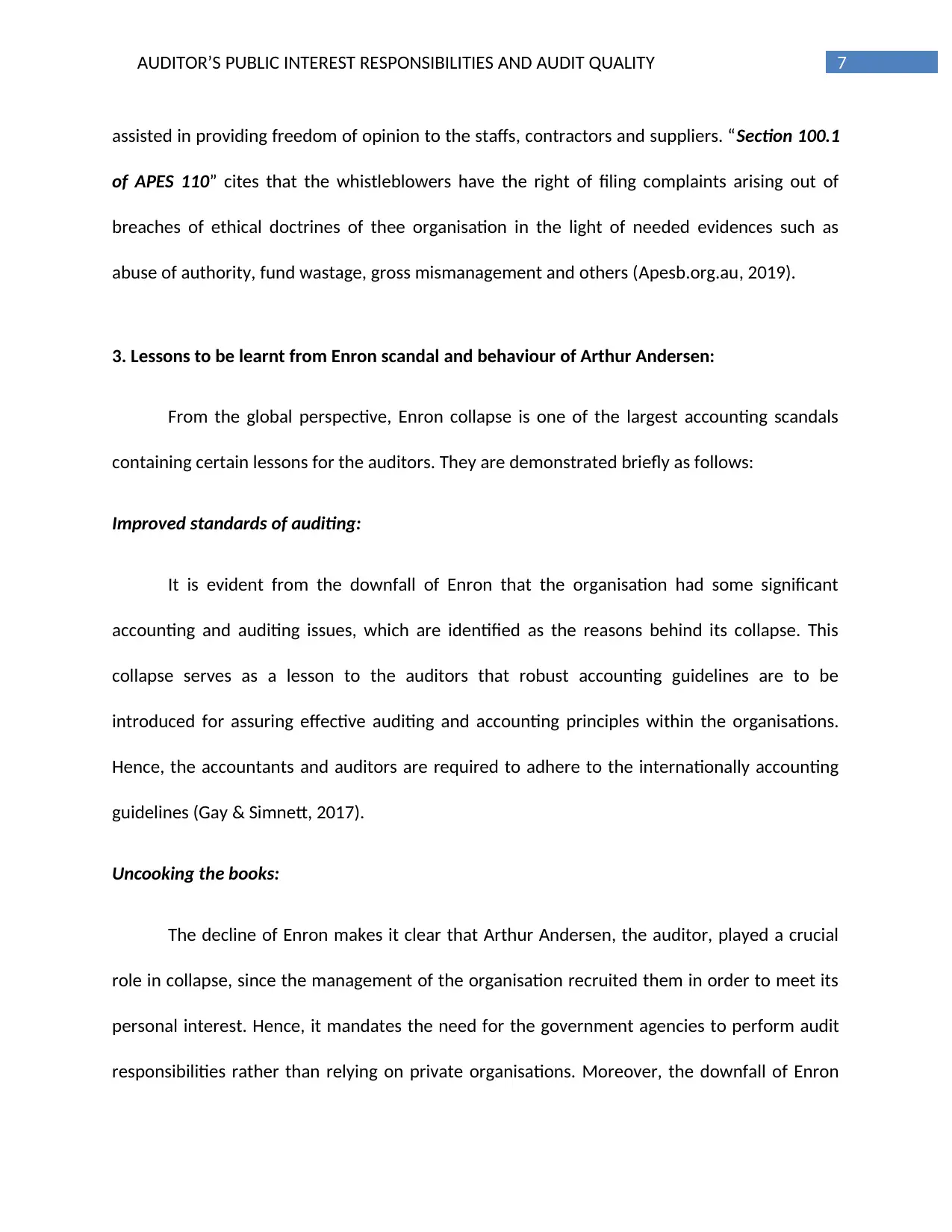
7AUDITOR’S PUBLIC INTEREST RESPONSIBILITIES AND AUDIT QUALITY
assisted in providing freedom of opinion to the staffs, contractors and suppliers. “Section 100.1
of APES 110” cites that the whistleblowers have the right of filing complaints arising out of
breaches of ethical doctrines of thee organisation in the light of needed evidences such as
abuse of authority, fund wastage, gross mismanagement and others (Apesb.org.au, 2019).
3. Lessons to be learnt from Enron scandal and behaviour of Arthur Andersen:
From the global perspective, Enron collapse is one of the largest accounting scandals
containing certain lessons for the auditors. They are demonstrated briefly as follows:
Improved standards of auditing:
It is evident from the downfall of Enron that the organisation had some significant
accounting and auditing issues, which are identified as the reasons behind its collapse. This
collapse serves as a lesson to the auditors that robust accounting guidelines are to be
introduced for assuring effective auditing and accounting principles within the organisations.
Hence, the accountants and auditors are required to adhere to the internationally accounting
guidelines (Gay & Simnett, 2017).
Uncooking the books:
The decline of Enron makes it clear that Arthur Andersen, the auditor, played a crucial
role in collapse, since the management of the organisation recruited them in order to meet its
personal interest. Hence, it mandates the need for the government agencies to perform audit
responsibilities rather than relying on private organisations. Moreover, the downfall of Enron
assisted in providing freedom of opinion to the staffs, contractors and suppliers. “Section 100.1
of APES 110” cites that the whistleblowers have the right of filing complaints arising out of
breaches of ethical doctrines of thee organisation in the light of needed evidences such as
abuse of authority, fund wastage, gross mismanagement and others (Apesb.org.au, 2019).
3. Lessons to be learnt from Enron scandal and behaviour of Arthur Andersen:
From the global perspective, Enron collapse is one of the largest accounting scandals
containing certain lessons for the auditors. They are demonstrated briefly as follows:
Improved standards of auditing:
It is evident from the downfall of Enron that the organisation had some significant
accounting and auditing issues, which are identified as the reasons behind its collapse. This
collapse serves as a lesson to the auditors that robust accounting guidelines are to be
introduced for assuring effective auditing and accounting principles within the organisations.
Hence, the accountants and auditors are required to adhere to the internationally accounting
guidelines (Gay & Simnett, 2017).
Uncooking the books:
The decline of Enron makes it clear that Arthur Andersen, the auditor, played a crucial
role in collapse, since the management of the organisation recruited them in order to meet its
personal interest. Hence, it mandates the need for the government agencies to perform audit
responsibilities rather than relying on private organisations. Moreover, the downfall of Enron
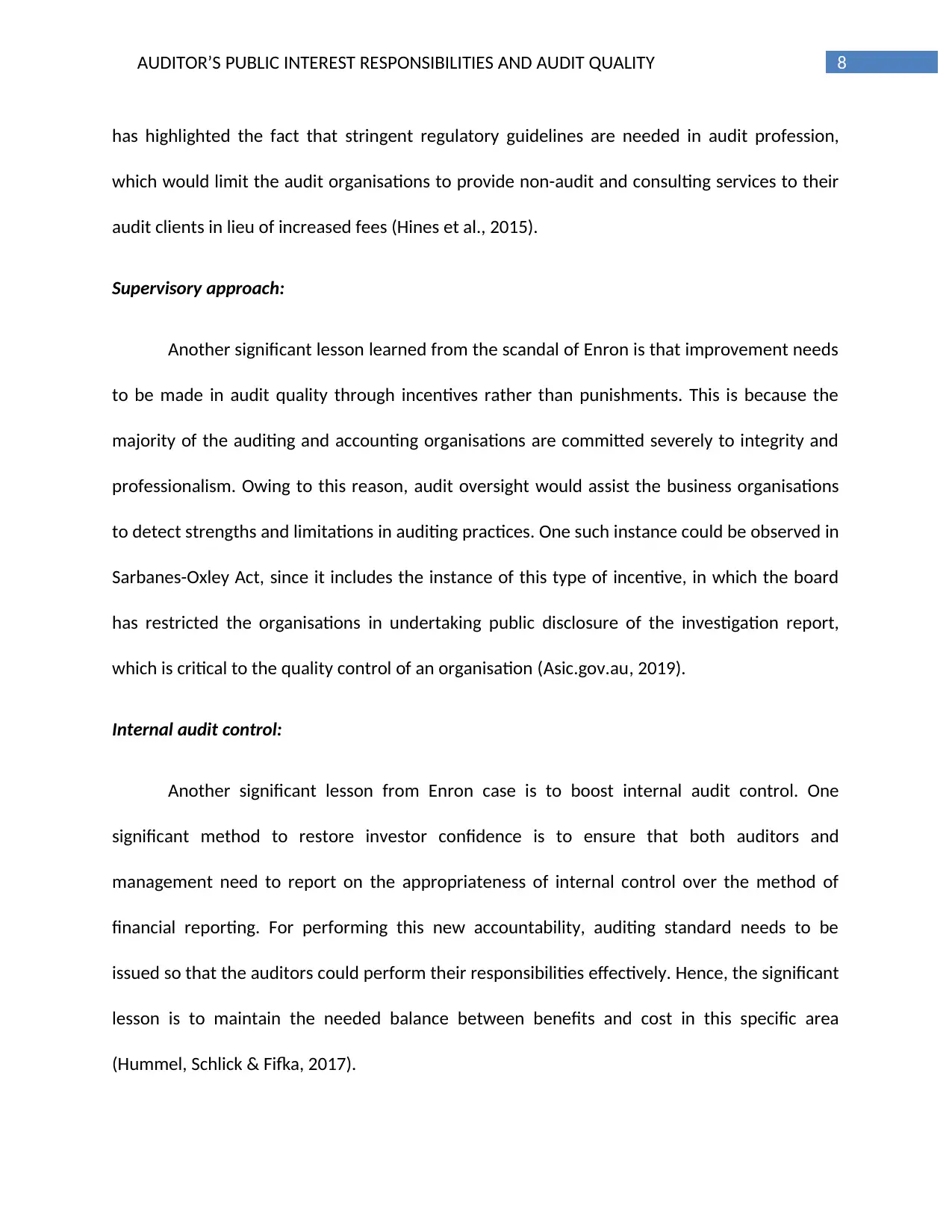
8AUDITOR’S PUBLIC INTEREST RESPONSIBILITIES AND AUDIT QUALITY
has highlighted the fact that stringent regulatory guidelines are needed in audit profession,
which would limit the audit organisations to provide non-audit and consulting services to their
audit clients in lieu of increased fees (Hines et al., 2015).
Supervisory approach:
Another significant lesson learned from the scandal of Enron is that improvement needs
to be made in audit quality through incentives rather than punishments. This is because the
majority of the auditing and accounting organisations are committed severely to integrity and
professionalism. Owing to this reason, audit oversight would assist the business organisations
to detect strengths and limitations in auditing practices. One such instance could be observed in
Sarbanes-Oxley Act, since it includes the instance of this type of incentive, in which the board
has restricted the organisations in undertaking public disclosure of the investigation report,
which is critical to the quality control of an organisation (Asic.gov.au, 2019).
Internal audit control:
Another significant lesson from Enron case is to boost internal audit control. One
significant method to restore investor confidence is to ensure that both auditors and
management need to report on the appropriateness of internal control over the method of
financial reporting. For performing this new accountability, auditing standard needs to be
issued so that the auditors could perform their responsibilities effectively. Hence, the significant
lesson is to maintain the needed balance between benefits and cost in this specific area
(Hummel, Schlick & Fifka, 2017).
has highlighted the fact that stringent regulatory guidelines are needed in audit profession,
which would limit the audit organisations to provide non-audit and consulting services to their
audit clients in lieu of increased fees (Hines et al., 2015).
Supervisory approach:
Another significant lesson learned from the scandal of Enron is that improvement needs
to be made in audit quality through incentives rather than punishments. This is because the
majority of the auditing and accounting organisations are committed severely to integrity and
professionalism. Owing to this reason, audit oversight would assist the business organisations
to detect strengths and limitations in auditing practices. One such instance could be observed in
Sarbanes-Oxley Act, since it includes the instance of this type of incentive, in which the board
has restricted the organisations in undertaking public disclosure of the investigation report,
which is critical to the quality control of an organisation (Asic.gov.au, 2019).
Internal audit control:
Another significant lesson from Enron case is to boost internal audit control. One
significant method to restore investor confidence is to ensure that both auditors and
management need to report on the appropriateness of internal control over the method of
financial reporting. For performing this new accountability, auditing standard needs to be
issued so that the auditors could perform their responsibilities effectively. Hence, the significant
lesson is to maintain the needed balance between benefits and cost in this specific area
(Hummel, Schlick & Fifka, 2017).
⊘ This is a preview!⊘
Do you want full access?
Subscribe today to unlock all pages.

Trusted by 1+ million students worldwide
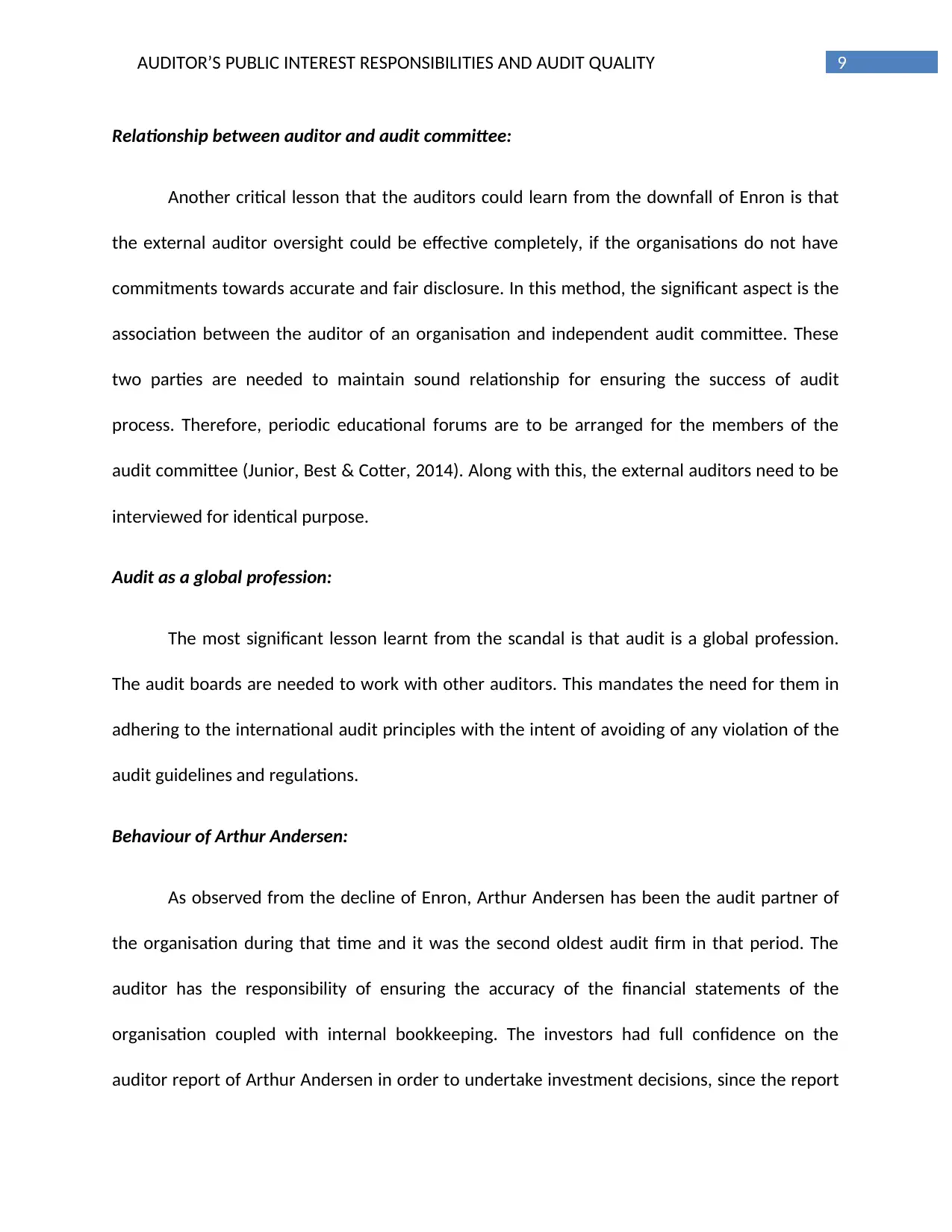
9AUDITOR’S PUBLIC INTEREST RESPONSIBILITIES AND AUDIT QUALITY
Relationship between auditor and audit committee:
Another critical lesson that the auditors could learn from the downfall of Enron is that
the external auditor oversight could be effective completely, if the organisations do not have
commitments towards accurate and fair disclosure. In this method, the significant aspect is the
association between the auditor of an organisation and independent audit committee. These
two parties are needed to maintain sound relationship for ensuring the success of audit
process. Therefore, periodic educational forums are to be arranged for the members of the
audit committee (Junior, Best & Cotter, 2014). Along with this, the external auditors need to be
interviewed for identical purpose.
Audit as a global profession:
The most significant lesson learnt from the scandal is that audit is a global profession.
The audit boards are needed to work with other auditors. This mandates the need for them in
adhering to the international audit principles with the intent of avoiding of any violation of the
audit guidelines and regulations.
Behaviour of Arthur Andersen:
As observed from the decline of Enron, Arthur Andersen has been the audit partner of
the organisation during that time and it was the second oldest audit firm in that period. The
auditor has the responsibility of ensuring the accuracy of the financial statements of the
organisation coupled with internal bookkeeping. The investors had full confidence on the
auditor report of Arthur Andersen in order to undertake investment decisions, since the report
Relationship between auditor and audit committee:
Another critical lesson that the auditors could learn from the downfall of Enron is that
the external auditor oversight could be effective completely, if the organisations do not have
commitments towards accurate and fair disclosure. In this method, the significant aspect is the
association between the auditor of an organisation and independent audit committee. These
two parties are needed to maintain sound relationship for ensuring the success of audit
process. Therefore, periodic educational forums are to be arranged for the members of the
audit committee (Junior, Best & Cotter, 2014). Along with this, the external auditors need to be
interviewed for identical purpose.
Audit as a global profession:
The most significant lesson learnt from the scandal is that audit is a global profession.
The audit boards are needed to work with other auditors. This mandates the need for them in
adhering to the international audit principles with the intent of avoiding of any violation of the
audit guidelines and regulations.
Behaviour of Arthur Andersen:
As observed from the decline of Enron, Arthur Andersen has been the audit partner of
the organisation during that time and it was the second oldest audit firm in that period. The
auditor has the responsibility of ensuring the accuracy of the financial statements of the
organisation coupled with internal bookkeeping. The investors had full confidence on the
auditor report of Arthur Andersen in order to undertake investment decisions, since the report
Paraphrase This Document
Need a fresh take? Get an instant paraphrase of this document with our AI Paraphraser
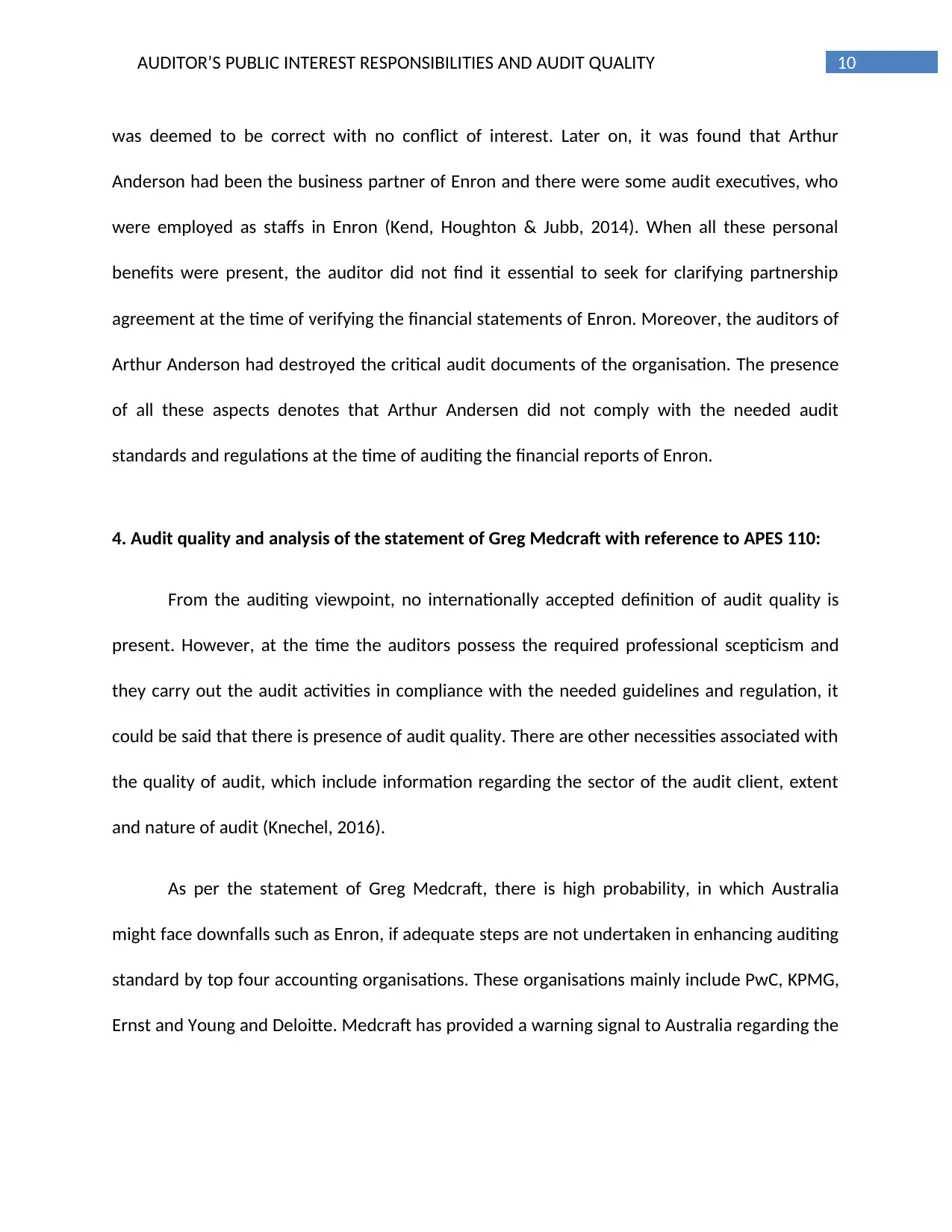
10AUDITOR’S PUBLIC INTEREST RESPONSIBILITIES AND AUDIT QUALITY
was deemed to be correct with no conflict of interest. Later on, it was found that Arthur
Anderson had been the business partner of Enron and there were some audit executives, who
were employed as staffs in Enron (Kend, Houghton & Jubb, 2014). When all these personal
benefits were present, the auditor did not find it essential to seek for clarifying partnership
agreement at the time of verifying the financial statements of Enron. Moreover, the auditors of
Arthur Anderson had destroyed the critical audit documents of the organisation. The presence
of all these aspects denotes that Arthur Andersen did not comply with the needed audit
standards and regulations at the time of auditing the financial reports of Enron.
4. Audit quality and analysis of the statement of Greg Medcraft with reference to APES 110:
From the auditing viewpoint, no internationally accepted definition of audit quality is
present. However, at the time the auditors possess the required professional scepticism and
they carry out the audit activities in compliance with the needed guidelines and regulation, it
could be said that there is presence of audit quality. There are other necessities associated with
the quality of audit, which include information regarding the sector of the audit client, extent
and nature of audit (Knechel, 2016).
As per the statement of Greg Medcraft, there is high probability, in which Australia
might face downfalls such as Enron, if adequate steps are not undertaken in enhancing auditing
standard by top four accounting organisations. These organisations mainly include PwC, KPMG,
Ernst and Young and Deloitte. Medcraft has provided a warning signal to Australia regarding the
was deemed to be correct with no conflict of interest. Later on, it was found that Arthur
Anderson had been the business partner of Enron and there were some audit executives, who
were employed as staffs in Enron (Kend, Houghton & Jubb, 2014). When all these personal
benefits were present, the auditor did not find it essential to seek for clarifying partnership
agreement at the time of verifying the financial statements of Enron. Moreover, the auditors of
Arthur Anderson had destroyed the critical audit documents of the organisation. The presence
of all these aspects denotes that Arthur Andersen did not comply with the needed audit
standards and regulations at the time of auditing the financial reports of Enron.
4. Audit quality and analysis of the statement of Greg Medcraft with reference to APES 110:
From the auditing viewpoint, no internationally accepted definition of audit quality is
present. However, at the time the auditors possess the required professional scepticism and
they carry out the audit activities in compliance with the needed guidelines and regulation, it
could be said that there is presence of audit quality. There are other necessities associated with
the quality of audit, which include information regarding the sector of the audit client, extent
and nature of audit (Knechel, 2016).
As per the statement of Greg Medcraft, there is high probability, in which Australia
might face downfalls such as Enron, if adequate steps are not undertaken in enhancing auditing
standard by top four accounting organisations. These organisations mainly include PwC, KPMG,
Ernst and Young and Deloitte. Medcraft has provided a warning signal to Australia regarding the
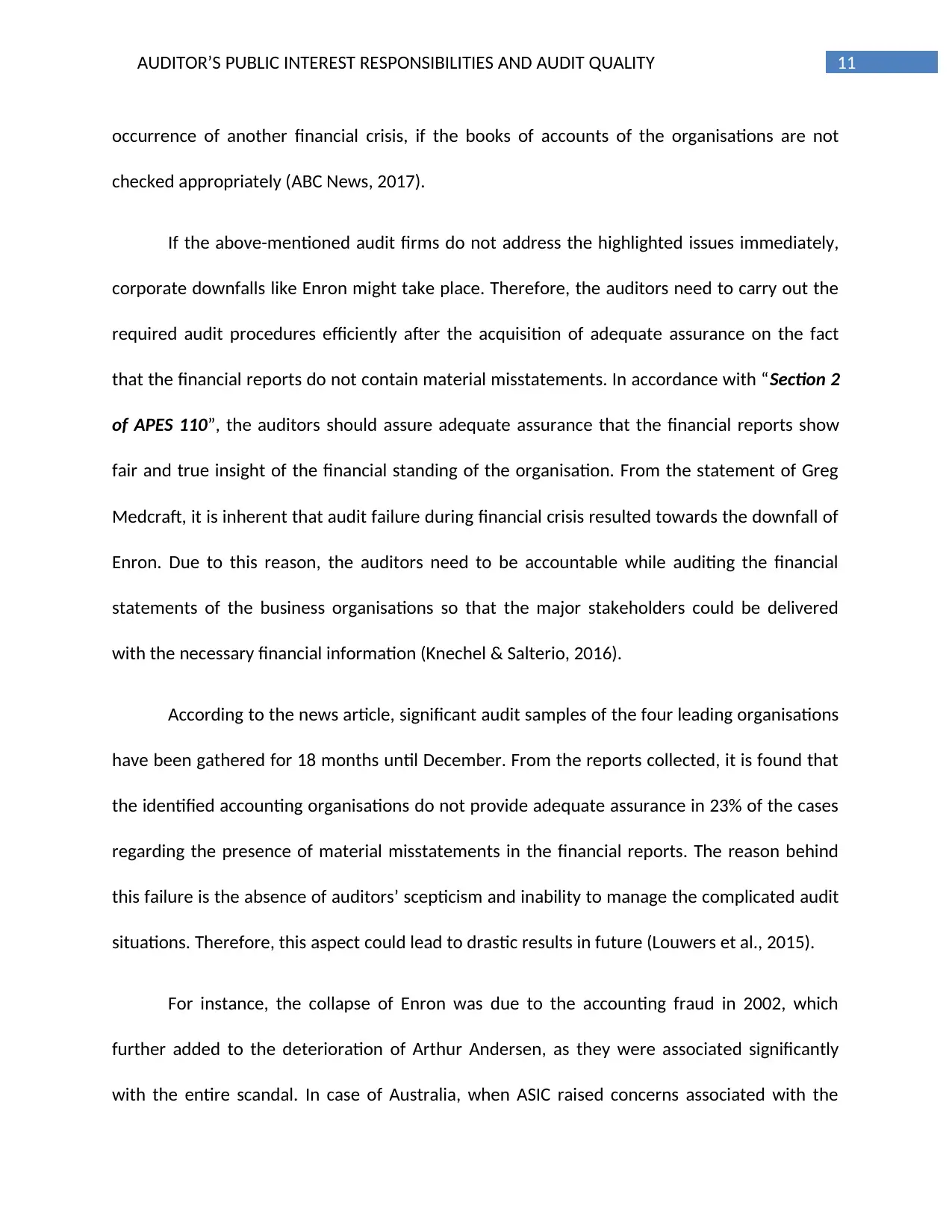
11AUDITOR’S PUBLIC INTEREST RESPONSIBILITIES AND AUDIT QUALITY
occurrence of another financial crisis, if the books of accounts of the organisations are not
checked appropriately (ABC News, 2017).
If the above-mentioned audit firms do not address the highlighted issues immediately,
corporate downfalls like Enron might take place. Therefore, the auditors need to carry out the
required audit procedures efficiently after the acquisition of adequate assurance on the fact
that the financial reports do not contain material misstatements. In accordance with “Section 2
of APES 110”, the auditors should assure adequate assurance that the financial reports show
fair and true insight of the financial standing of the organisation. From the statement of Greg
Medcraft, it is inherent that audit failure during financial crisis resulted towards the downfall of
Enron. Due to this reason, the auditors need to be accountable while auditing the financial
statements of the business organisations so that the major stakeholders could be delivered
with the necessary financial information (Knechel & Salterio, 2016).
According to the news article, significant audit samples of the four leading organisations
have been gathered for 18 months until December. From the reports collected, it is found that
the identified accounting organisations do not provide adequate assurance in 23% of the cases
regarding the presence of material misstatements in the financial reports. The reason behind
this failure is the absence of auditors’ scepticism and inability to manage the complicated audit
situations. Therefore, this aspect could lead to drastic results in future (Louwers et al., 2015).
For instance, the collapse of Enron was due to the accounting fraud in 2002, which
further added to the deterioration of Arthur Andersen, as they were associated significantly
with the entire scandal. In case of Australia, when ASIC raised concerns associated with the
occurrence of another financial crisis, if the books of accounts of the organisations are not
checked appropriately (ABC News, 2017).
If the above-mentioned audit firms do not address the highlighted issues immediately,
corporate downfalls like Enron might take place. Therefore, the auditors need to carry out the
required audit procedures efficiently after the acquisition of adequate assurance on the fact
that the financial reports do not contain material misstatements. In accordance with “Section 2
of APES 110”, the auditors should assure adequate assurance that the financial reports show
fair and true insight of the financial standing of the organisation. From the statement of Greg
Medcraft, it is inherent that audit failure during financial crisis resulted towards the downfall of
Enron. Due to this reason, the auditors need to be accountable while auditing the financial
statements of the business organisations so that the major stakeholders could be delivered
with the necessary financial information (Knechel & Salterio, 2016).
According to the news article, significant audit samples of the four leading organisations
have been gathered for 18 months until December. From the reports collected, it is found that
the identified accounting organisations do not provide adequate assurance in 23% of the cases
regarding the presence of material misstatements in the financial reports. The reason behind
this failure is the absence of auditors’ scepticism and inability to manage the complicated audit
situations. Therefore, this aspect could lead to drastic results in future (Louwers et al., 2015).
For instance, the collapse of Enron was due to the accounting fraud in 2002, which
further added to the deterioration of Arthur Andersen, as they were associated significantly
with the entire scandal. In case of Australia, when ASIC raised concerns associated with the
⊘ This is a preview!⊘
Do you want full access?
Subscribe today to unlock all pages.

Trusted by 1+ million students worldwide
1 out of 19
Related Documents
Your All-in-One AI-Powered Toolkit for Academic Success.
+13062052269
info@desklib.com
Available 24*7 on WhatsApp / Email
![[object Object]](/_next/static/media/star-bottom.7253800d.svg)
Unlock your academic potential
Copyright © 2020–2026 A2Z Services. All Rights Reserved. Developed and managed by ZUCOL.





